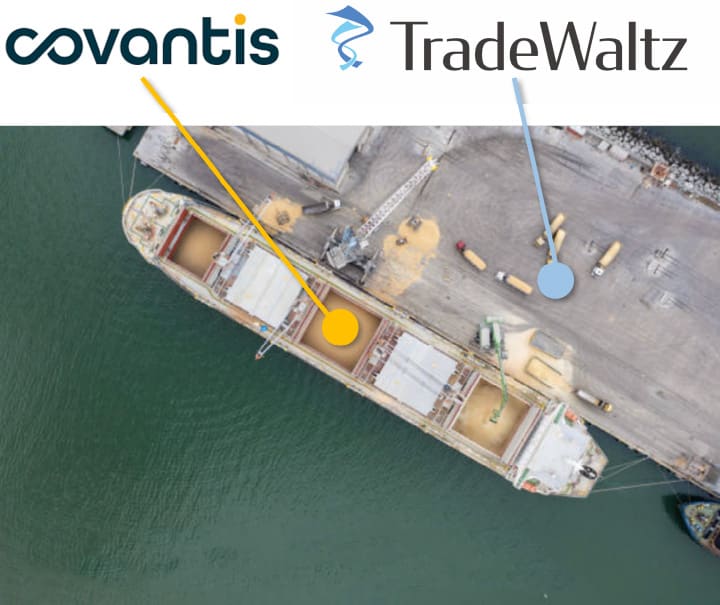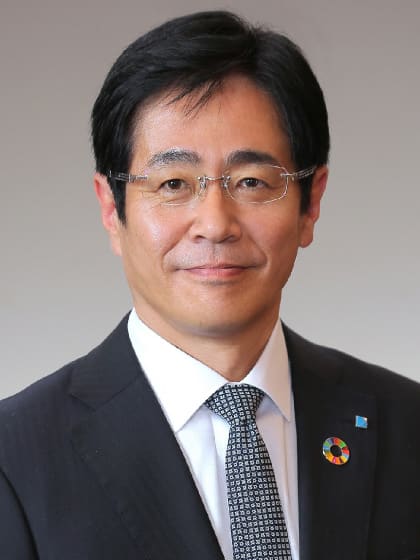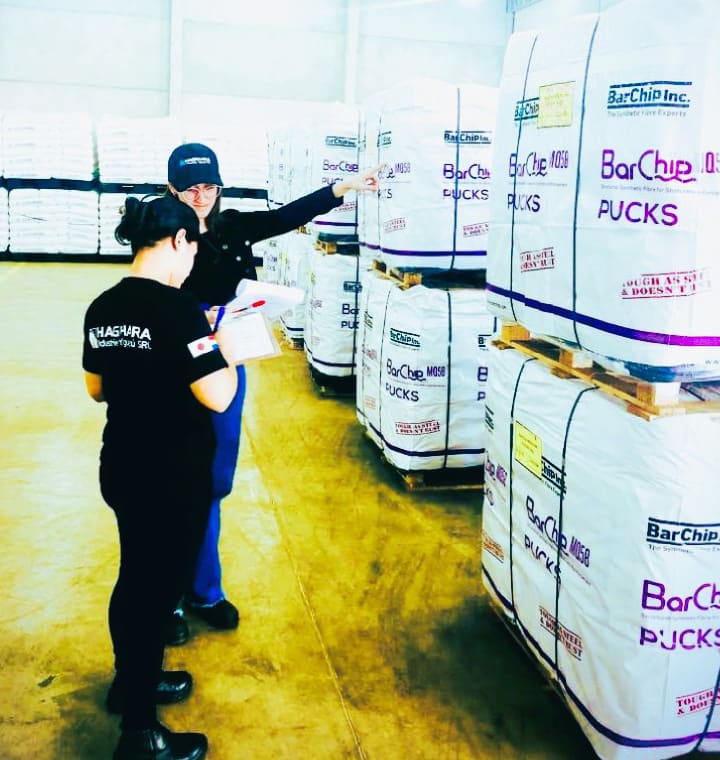Page 3
Practicing Environmental Stewardship
Here are two Japanese start-ups, both active in South America, that are advancing efficiency in two very different sectors through digitization. Allm contributes to advances in health care through digital innovation, and TradeWaltz is using digitization to streamline trade.
The Allm Revolution in Health Care Management

A demonstration of the Join app
Allm, a Japan-headquartered information and communications technology company in the medical sector, is revolutionizing acute care management in Brazil. Ischemic heart disease and cerebral stroke are Brazil’s top two causes of mortality. Stroke is a race against time, as expressed in the phrase “time is brain,” and the same goes for ischemic heart disease. When a patient suffers from stroke, every minute without treatment means the death of 1.8 million nerve cells. Getting treatment as soon as possible can therefore mean the difference between life and death. However, the lack and disparity of specialists needed for treatment decisions is a common challenge globally, hindering fast and accurate care.
Allm, in collaboration with the governments of the states of Maranhão and Alagoas and in partnership with Boehringer Ingelheim Brasil in nine other Brazilian states, is supporting the establishment and operation of tele-stroke and tele-cardiovascular networks in Brazil. Those networks run on Allm’s proprietary Join app for physician-to-physician communication. Join allows real-time, secure sharing of patient information, including computed tomography and electrocardiogram images. That allows physicians to obtain the information they need to make prompt decisions on treatment wherever they are through their mobile phones.
Making a Difference
Join links more than 400 health facilities and more than 16,000 health professionals in Brazil. The specialists provide diagnostic support within 10 minutes of consultation. That is leading to impressively faster diagnosis and treatment, to reduced disability and mortality, and to lower healthcare costs. Patients have received more than 2,000 administrations of tissue plasminogen activator in the past three years as stroke treatment on physician recommendations through Join.
Allm is extending the Join network to other Brazilian states and to additional disease categories, such as cancer and respiratory disease. The company is thus working toward fulfilling its mission of eliminating disparities and inefficiencies in healthcare while broadening access to quality care.
Commitment to Transforming Global Trade for the Better

Making the South American–Japanese supply chain more resilient
Imports of grain and oilseed, such as soybeans and corn, from South America are crucial to fulfilling Japanese demand for foodstuffs. Digitization makes a huge and growing contribution to streamlining the supply chain for those commodities. Exemplifying that trend is the blockchain-based platform Covantis, a joint initiative by several global leaders in commodities trading. Value-chain stakeholders use Covantis for about 80% of Brazil’s grain and oilseed exports and for such exports from all other origination markets, including the United States, Canada, Argentina, Uruguay, and—as of early 2024—Europe and Australia. Japan has lagged, however, in digitizing the import side of trade flows.
Enter TradeWaltz, a blockchain-based trade management platform backed by several large Japanese corporations. Meshing Covantis and TradeWaltz, if possible, could further streamline trade procedures. The policy planners at Japan’s Ministry of Economy, Trade and Industry (METI) are strong believers in the potential for streamlining trade with advanced data processing. METI is subsidizing TradeWaltz in that spirit, and the company is conducting interviews with importers and port logistics companies to identify ways to optimize its trade management initiatives.
“TradeWaltz will endeavor to improve operational efficiency,” declared TradeWaltz president and CEO Hirohisa Kojima on October 28, 2020, “by digitizing all trade-related documents and to provide new value through the use of trade data. Our mission is to make safe, secure, and smooth trade a reality for all of our platform’s users.”
Covantis CEO Petya Sechanova expressed similar commitment on February 25, 2021, in announcing the launch of the Covantis platform. “Two years ago, we set out on a journey to transform a system of global trade that had changed very little for the last century. . . . Today, we’re proud to launch our industry-changing digital platform in time for the beginning of the Brazilian export season. We look forward,” she continued, “to working with our partners to use this technology to enhance efficiencies and reduce operational risk in this first key market.”
Hagihara Industries’ BarChip Revolution in Concrete

Asano Kazushi
President of Hagihara Industries
South American concrete is becoming better on account of innovative reinforcement technology produced and supplied locally by Japan’s Hagihara Industries. Hagihara’s proprietary concrete reinforcement, BarChip, is macro synthetic fiber that is superior to conventional steel reinforcement in affordability, in corrosion resistance, in ease and safety of installation, and in crack prevention. BarChip eliminates the need in concrete flooring for precautionary steel reinforcement and for welded steel mesh, which shortens construction periods.
Hagihara, headquartered in Kurashiki, Okayama Prefecture, handles BarChip through a wholly owned subsidiary. It began supplying BarChip in South America more than 17 years ago, mainly as reinforcement for concrete used in mineshafts. BarChip has earned acclaim for its superiority to steel reinforcement and has won acceptance in applications beyond mining, such as concrete flooring for warehouses.
“Our presence in South America,” explains Hagihara president Asano Kazushi, “has grown steadily, largely in connection with marketing and manufacturing BarChip. We have sales operations in Brazil, Chile, Mexico, Peru, and—as of 2023—in Paraguay. Our newly established subsidiary in Paraguay includes a plant for producing BarChip locally.”
South American demand for BarChip has been especially robust in recent years in connection with an ongoing boom in warehouse and factory construction. The Covid-19 pandemic occasioned a shortage of shipping containers and triggered a skyrocketing increase in shipping costs. That prompted management at Hagihara to move the production of BarChip as close as possible to the product’s principal markets.
A Home Away from Home in Paraguay

Workplace activity at Hagihara’s Paraguay plant
A Hagihara representative had taken part in a JICA-sponsored study mission to Latin America in November 2018. That mission visited Japanese-affiliated companies in the region to allow the mission participants to explore possibilities for collaboration. The Hagihara representative developed in Paraguay the beginnings of what became a fertile network of connections.
Underlying Paraguay’s appeal as a business setting for Japanese companies is the nation’s thriving community of ethnic-Japanese citizens. Companies enjoy access to a large pool of high-quality human resources who are fluent in Japanese and well acquainted with Japanese culture. Augmenting the appeal of Paraguay for Hagihara was the availability of hydroelectric power. That qualified the company’s Paraguayan plant, in the city of Ciudad del Este, as a net-zero emitter of power-related carbon dioxide. The plant’s electric power comes, incidentally, from the massive Itaipu Dam on the Paraná River on the Paraguayan-Brazilian border.
Locating the Hagihara plant in Paraguay was an example of the Brazil Plus One supply-chain strategy: Accompany a presence in South America’s largest nation with complementary presences elsewhere in the region. Hagihara enjoys close proximity to Brazil’s vast market and to the vaster-still Mercosur common market.
“The Paraguay plant,” notes Asano “is our first production facility for BarChip in the Americas. We look forward to contributing there to enriching the region’s infrastructure and to growing hand in hand with our neighbors in South America.”

